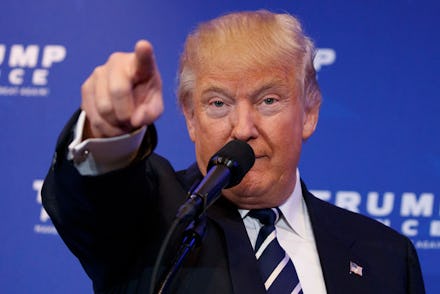370 economists just accused Donald Trump of misleading the public with his economic plan

It's not exactly news that many economists have reservations about Republican presidential nominee Donald Trump.
Yes, Democratic presidential nominee Hillary Clinton has economist detractors, too, and back in September, a group of more than 300 economists signed a letter criticizing her policies. The crux of their argument was that Clinton's proposals extend policies enacted under President Barack Obama — like minimum wage hikes and Obamacare — and these could prevent U.S. economic growth from being as fast as it should be.
But a new letter condemning Trump and signed by 370 economists — including eight Nobel laureates, among them 2016 winner Oliver Hart — is different, as Wall Street Journal's Nick Timiraos explains.
Rather than focusing on ideological differences, the letter, published Tuesday in the Wall Street Journal, calls out Trump for his repeated attempts to mislead the public.
Among other objections, the economists point out that Trump's trade policies could start a trade war. The letter accuses him of using immigration as a "red herring" to explain why Americans with less education have seen stagnating wages — as opposed to other, likelier causes, like the automation of jobs.
The economists also argue that Trump promotes "magical thinking and conspiracy theories" over facts, which they say makes him a "dangerous, destructive choice for the country."
Economist and Trump advisor Peter Navarro dismissed the letter, telling the Wall Street Journal "you shouldn't believe economists or Nobel Prize winners on trade."
It is true that many of the economists who signed the letter work as academics, and there is some evidence academia leans to the political left.
But economists from both sides of the aisle — including six who advised Republican presidents — have reached similar conclusions about Trump's policies.
Overall, the Peterson Institute for International Economics forecasts that Trump's trade policies would cost roughly 5 million jobs.